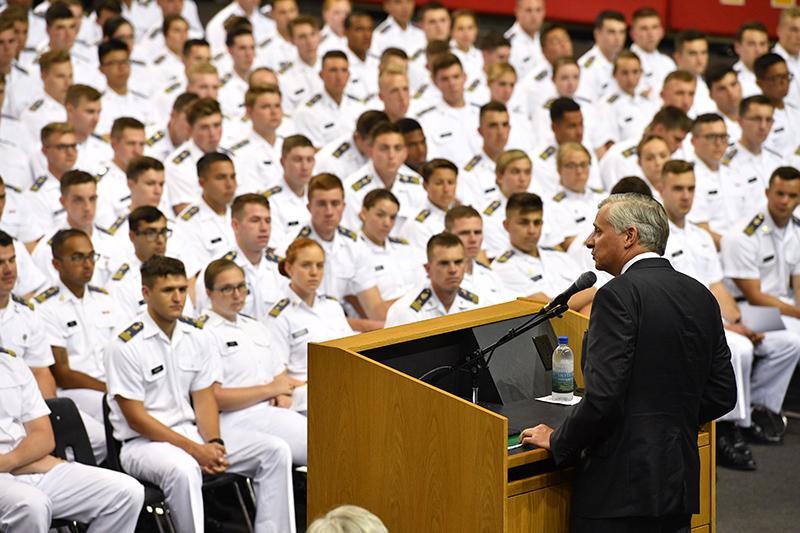Meacham Highlights Presidential Virtues

Presidential historian Jon Meacham speaks at Academic Convocation today.—VMI Photo by H. Lockwood McLaughlin.
LEXINGTON, Va., Sept. 5, 2018—Two of the most common questions presidential historian Jon Meacham is asked in regards to today’s society is “has it ever been like this? has it ever been worse?” and “how do we get out of it?”
Meacham went on to answer those questions by exploring characteristics of good leadership and followership at VMI’s annual Academic Convocation today, priming the cadets for lessons they will learn throughout the academic year.
Meacham offered a way of viewing their own contributions to American civic life through the examples set by U.S. presidents.
“The future does not belong to observers of democracy. The future belongs to activists and citizens who say this is not what we want,” Meacham said.
He noted that the U.S. Constitution, to which many cadets will swear allegiance, was designed for seasons of unrest and unhappiness in public society and “it assumes we will get everything wrong but it gives us the best possible chance to get something right for a more perfect union to unfold.”
He elaborated on characteristics of good presidents from curiosity to candor and the humility to ask for help. Specifically, he noted John F. Kennedy's call to former President Dwight D. Eisenhower for advice and to learn from his mistakes after the disastrous Bay of Pigs invasion by U.S.-supported Cubans hoping to overthrow the Castro regime. He used lessons he learned from that misadventure when confronted with the challenge of the Cuban missile crisis in 1962, lessons that may have prevented a nuclear war.
“You all are young. As you get older, it gets harder to admit that you need to learn something,” Meacham said to the cadets.
After the journey through past presidents' lives, Meacham wrapped up with lessons from his conversations with former President George H.W. Bush, including a letter that he read from the president to Bush’s mother about Robin Bush, his daughter who died from leukemia as a child.
The letter, written shortly before the birth of their fourth son, described the palpable absence left by his daughter’s death. Meacham asked George H.W. Bush to read the letter aloud for him. He described Bush’s emotional reaction.
“We were making enough commotion that his chief of staff came in and saw what we were doing that, asked ‘why did you ask him to read that?’” Meacham replied “If you want to know someone’s heart,” and Bush finished, “you have to know what breaks it.”
“If you all become the leader George H.W. Bush was, well done. Even better done if you become the men and women [with the human qualities of] George Bush . . .,” he said. “That man embodies the best of the soul of this country and I am confident you all can too.”
Meacham is the author of a newly published book, The Soul of America: The Battle for Our Better Angels. In it, he discusses how the highly partisan political climate we find ourselves in today is not new at all but has been a recurring feature of American history, from Reconstruction and the advent of the Lost Cause to the fight for civil rights in the 1960s.
His other works include the Pulitzer Prize-winning biography, American Lion: Andrew Jackson in the White House, Destiny and Power: The American Odyssey of George Herbert Walker Bush, and Thomas Jefferson: The Art of Power.
-Ashlie Walter
—VMI—
.svg)
.png)